- Home
- Garth Stein
Raven Stole the Moon Page 2
Raven Stole the Moon Read online
Page 2
“What’s the cause?”
“Hmm?”
“The good cause. What’s the cause?”
“Oh, I don’t know,” Christine said, surprised at the question. “The disabled, I think. The mentally disabled. Does it matter what the cause is as long as it’s good?”
Christine spit out a hacking laugh. Heck, heck, heck. Cough-laughing. A Scandinavian tradition. Jenna tried to twist her grimace into a smile, but she wasn’t sure it worked.
“Sure, Christine, I’ll take five.”
“Five? Well. What’s your secret, Jenna? You look so thin.”
“I’m on a strict diet of water and Campfire Girl mints.”
Heck, heck, heck.
Christine became serious. She put her hand on Jenna’s arm, a serious gesture. She swayed slightly in the breeze.
“Seriously, Jenna. How are you?”
“I’m fine.”
“Yes, but how are you? It must be so hard for you this time of year.”
Jenna looked into Christine’s drunken eyes. They seemed to focus independently, like a fish. There was a white foam spot on the corner of her mouth. Her teeth were stained. Her breath smelled like a smoked salmon omelet.
“It must be so hard for you.”
Jenna imagined that the inside of Christine’s head was a giant clam. It was a pulsating sack that sucked water in and spit it out to propel itself. Her head sat on the ocean floor. A bivalve mollusk. It sucked in through one ear and spit out through the other, each time the head skimming a few inches above the sand and settling back down.
“Times like these I’m grateful I have Robert.”
A starfish jumped her head. It pried her skull open and sucked the juicy mussel out. One valve, then the other. Sucked and slurped her gooey brain right out of her ear.
“Oh, I know. Without family, where would any of us be?”
“Excuse me, Christine, there’s Robert. Don’t let me leave without those mints.”
Kiss, kiss.
Jenna almost gagged as she caught a whiff of Christine’s breath. Hangtown fry. Oysters and scrambled eggs. Bivalves and embryo.
Robert was entertaining a group of brokers near the bar as Jenna approached. Those brokers sure can drink. I guess when you’re always worried about losing your job, it makes you tense. How’s the market? Not a penny less than twenty-four dollars a square foot.
She looked on as Robert told an animated story to three other men. They were all in their early thirties. Some more successful than others, of course. All of them former college athletes. That goes over big in the world of real estate. They can all pee together and say things like, “When I played for the Huskies, you know, back when we used to go to the Rose Bowl, we used to get wasted and pick up hookers down on Western. Look, you can see it from here. Man. If we had bought then . . .”
Robert was the most successful. He drove the nicest car. He lived in the nicest house. He had the best, smartest, most beautiful wife. And until two years ago, he had the best, smartest, most handsome son. But that’s all over now, isn’t it? How long does it take to get over something like that? Forever. You don’t get over it. A child is a creation. It is your blood in another. It is your life. The worst thing that can happen is that you lose your child.
Robert spotted Jenna and called out to her as the three drunken brokers eyed her up.
“Jenna, honey, come over here. I was telling them about when we went back to Cleveland. Remember how angry you were when there was no Christmas tree?”
“I wasn’t mad. I was disappointed.”
The three laughed.
“You were pissed. She was so pissed. She broke a branch off a tree in the yard and put it in our room. Our own little Christmas tree!”
The three laughed more. Three non-Jews. Why does Robert play the Jew? Does he think it gives him a psychological advantage? He’s probably right.
“Jenna’s got it made! She’s Jewish, American Indian, and Christian. Think of the holidays! She could take half the year off with religious holidays!” Laugh, laugh. “We’re having a potlatch next week. Everyone in the village is invited!”
Their heads almost exploded with laughter. Their faces were covered with huge pores oozing out some foul combination of sweat and oil. These guys are not going to age gracefully. Jenna studied the tumbler full of scotch and ice in Robert’s hand.
“I guess I’m the designated driver tonight, Robert?”
He stopped laughing. The three friends got that goofy look on their faces when someone gets in trouble. They put their hands to their mouths to keep from laughing. Robert wheeled on Jenna and glared at her.
“What’s that supposed to mean?”
“Nothing. I won’t have another glass.”
“I was telling a story—”
“Keep going, it was funny.”
“—and you cut me off. Where’s your sense of humor?”
“I just wanted to know if I could have another glass of wine.”
“Bullshit. You never have a second glass of wine. You cut me off and you know it.”
“Robert.”
“Admit it.”
She looked at him incredulously. The three friends had slipped away. Now it was just Robert and Jenna in the middle of the room, attracting the attention of others. Heads turned. Everyone could see that he was disciplining her for her bad behavior.
“Robert, stop it,” Jenna said under her breath. “Don’t do this to me in public.”
Robert grabbed Jenna’s arm and led her to the side of the room. He knocked on a door and opened it. It was a bathroom. He pulled her inside.
“Why did you do that to me?”
“Do what? Robert, I didn’t do anything.”
“You humiliated me in front of my colleagues.”
“You didn’t need any help from me,” Jenna said. She sat on the closed toilet seat and crossed her legs, trying to appear calmer than she was.
“Don’t be a bitch,” he said sharply. Jenna winced. She hated that word and he knew it. “If you didn’t think you could make it through the party, you should have stayed at home.”
Jenna looked up quickly.
“What’s that supposed to mean? Why wouldn’t I be able to make it through the party?”
“Well, you’re obviously still upset about my lighting a candle for Bobby and you’re taking it out on me. Which is completely typical.”
“Typical?”
“Yeah, typical. You typically can’t get over your guilt and I typically can. Look, it’s not my fault if you still feel guilty about him. It’s not my fault if I’ve processed it and I can act like a normal human being. I light a candle. I like to do it—it helps me. If you can’t stand it, well, that’s too bad.”
Jenna bit her lip to keep from lashing out. She wasn’t going to let a scotch-soaked Robert suck her into a fight that neither of them would win. A slug-fest in the Landis powder room. Blood on the floor. She stood up and opened the door.
“You should have another drink, Robert. It really makes me attracted to you.”
She looked up at Robert, who was glaring at her with hard eyes. There was hatred in that look, nothing less. Deep down and unmistakable. She stepped out into the party and closed the door behind her.
Jenna headed straight for the terrace. She needed some fresh air to clear her head. All that oppressiveness in the bathroom was making her dizzy. Once outside, she took a deep breath. She wasn’t going to get upset. She wasn’t going to let Robert do it to her twice in one night. No way. She walked along the edge of the railing. Everything’s fine. Keep moving. Shake it off. He’s drunk. He’s the one with the problem. He’s the bad guy.
After a couple of minutes Jenna felt back in control, her emotions recontained in her Tupperware mind. She went inside and got a glass of Perrier at the bar. She didn’t want another glass of wine anyway. Robert was right about that. She had only wanted to stop him and his idiotic story. The alcohol was making Robert talk a little too loud and laugh
a little too hard, and that always embarrassed Jenna. Not to mention the fact that he would get so drunk at a party of such prominence. This was a working party. Deals were being made. Relationships nurtured. Standing around with drunken underachievers made Robert look like another one of the losers.
Usually, Robert stood out from the pack. He was well put together, as Jenna’s father would say. He’s got a good presentation. Yessir. Doesn’t drink too much. Doesn’t talk too much. Doesn’t think too much. Gets the job done and gets it done right. A nice Jewish boy.
Dad was Jewish. Even though he disavowed himself of all outward Jewish trappings, he was a Jew deep down and Jenna knew it. He was happy that Jenna found Robert. He didn’t have some romanticized idea that they would raise their kids Jewish, but he felt, in his soul, that another Jew would be born to the world.
Dad, too, was surprised to hear that Robert’s family didn’t have a Christmas tree. Christmas isn’t religious, it’s American. What American won’t celebrate Christmas? The best way to avoid religious persecution is to avoid being too religious. That’s what he said. He didn’t even mind when they chose to name their son after his father. “That’s all superstition,” her father beamed. “Robert is a fine name.”
Jenna snapped out of her reverie and found herself standing in a quiet hallway that seemed to lead to the bedrooms. She looked around. It was obviously the Hall of Records. The walls were covered with photographs of the Landis family. Hundreds of photographs, starting with old black-and-whites of the grandparents and progressing up through new portraits of tiny babies. Jenna scanned the walls quickly. High school proms. Weddings. Christmas shots with Santa. Vacations. She lingered on a shot of Ted Landis and one of his sons when he was younger, about Bobby’s age, it seemed. They were standing on a dock. A lake glimmered in the background with afternoon sun. The boy held a fish proudly. Jenna stood before the photo, unable to tear herself away. It was such a simple photo. Such a simple event. A boy, his father, and a fish. It’s universal. Every family has a photo like this. Every father has taken his son fishing. But they don’t all go fishing in Alaska. They don’t all go to Thunder Bay. The son doesn’t always drown.
“Jenna.”
Jenna looked up. It was Christine. Mints.
“Jenna. We’re leaving.”
Christine grabbed Jenna’s arm and led her into a bedroom.
“Is Robert drunk?”
“I think, probably.”
“Because he was talking about . . . Bobby. You know. What happened. ”
Jesus, it doesn’t stop. Jenna closed her eyes and exhaled.
“It’s our anniversary,” she said.
“Really? I thought you were married in the winter.”
“No. The anniversary of Bobby’s death.”
Christine froze in the dark bedroom. Outside the window, the lights from downtown sparkled in the distance. An orange streetlight cast an eerie glow on Christine’s face. She looked at Jenna with compassion. Compassion never before imaginable from this woman. True pity. Sincere.
“Oh, Jenna, I’m so sorry. So, so sorry.”
She wrapped Jenna in an embrace. Jenna’s head fell against Christine’s shoulder and Jenna gave in to this woman with the clam head. Jenna began to cry. Deeply. Sobbing. Gasping for breath. Oh, the horror. The inequity. The smell of perfume and body odor. The rough hands of Christine stroking your hair. The floodgates opened and out came a flood.
It must have been minutes. Jenna heard other people in the room. Someone coming and going. Christine waving someone away. Telling them, shush up. Go away. Stroking. Because it really is painful. It really is. It’s a wound like any other. A broken arm gets a cast. A cut gets some stitches. A soul gets tears.
Jenna sat up on the bed. Christine was still there, looking at her. She glanced at her watch. To be forgiven. How can a clam not look at her watch? It was nice of her to stay this long.
“Are you going to be all right? We have to get back to the Island.”
Jenna sniffed. Wiped her nose.
“I’m sorry, Christine. You were right. It is hard this time of year.”
“Oh, Jenna. But Peter wants to go. I should go. Are you going to be all right? I could take a cab. I could stay with you. Maybe I should stay.”
“No, no. I’m fine, really. You’ve been too kind. I’m so embarrassed. I really am. The mints. Don’t leave without my getting the mints.”
Jenna staggered to her feet. She felt around for her purse and looked inside. Her wallet had no cash. There was another wallet. It was Robert’s. He never likes to carry his wallet because it bulges his suit. She pulled out a twenty-dollar bill.
“Give me five boxes.”
Christine looked at Jenna and smiled.
“That really is generous of you, Jenna. You are a very good soul, really.”
Christine counted five boxes of mints out of a larger cardboard box. She took the money, kissed Jenna’s cheek, and left.
Jenna sat in the room. She put the wallet back in her purse. There were keys in the purse, too. Car keys. A moment’s hesitation. She looked in the wallet and saw the parking stub for the garage. She stood up and left the bedroom.
The party was still going full bore, even though it was approaching midnight. Jenna paused for a moment, with her makeup-smeared face and her red eyes, clutching five boxes of Campfire Girl mints to her breast. Robert was still talking to colleagues. Still drinking. Jenna breathed deeply. A good-bye breath.
And like that, Jenna left.
Chapter 4
DR. DAVID LIVINGSTONE LOOKED MORE LIKE A CRAZY MAN than a shaman. He stood on the dock, his hair tied tightly in a ponytail that sprouted from the top of his head, his eyes closed, his palms outstretched in a kind of prayer. He was wearing nothing but paisley boxer shorts and running shoes. Around his neck hung a small chamois bundle on a braided leather rope. Before him lay his shaman garb, spread out on the unrolled pieces of burlap that had held it. Ferguson shivered for David; it wasn’t exactly warm out. But David didn’t seem to notice the temperature. His lips moved as he spoke silent words to himself, and after a few minutes of standing in this fashion, David opened his eyes and looked down at his costume.
“You from up here, Ferguson?” he asked, bending down and picking up a deerskin skirt fringed with ivory beads.
Ferguson nodded. “Wrangell.”
David tied the skirt around his waist and then pulled a kind of poncho, also of deerskin, over his head. Both the skirt and the poncho were decorated with figures painted in red and black.
“Can I ask you a question?” Ferguson asked.
“Sure.”
“Do you do this a lot? You know, work for companies like this.”
David chuckled softly. “A fair amount, I guess. I don’t usually exorcise spirits, though.”
“Really? What do you usually do?”
“Mostly I work for fishing companies. I predict where the fish will be that season. Or I’ll bless a fleet of boats. One time I was hired by a logging company to apologize to the spirits for them because they had killed hundreds of owls while they were clear-cutting.”
“Damn.”
“Yeah. What’s sad is that they were just doing it as a public relations move. They didn’t care what I did. I could have recited ‘Mary had a Little Lamb’ in Tlingit and it wouldn’t have made a difference to them.”
“Ah,” Ferguson murmured, shaking his head solemnly.
“Just wondering,” he continued. He had to ask. “Did you recite ‘Mary Had a Little Lamb’ in Tlingit?”
David smiled.
“It doesn’t translate. They don’t have lambs in Alaska so there’s no word for them. But you know what I mean.”
“Oh, sure, I know what you mean.”
Ferguson knew. He knew that David meant that there is often a discrepancy between what is contracted and what is expected. But David hadn’t answered the real question: Which had he delivered? It was an important distinction to Ferguson. For, even thoug
h Ferguson may not have believed all the Indian stuff, his investors did, and Ferguson had an obligation to come through with what they asked for. They weren’t paying five thousand dollars for some nursery-rhyme mumbo jumbo.
David tied a necklace of bear claws around his neck. He placed a strange kind of crown on his head, made from goat horns held together by leather straps.
“What do you know about the history of this town, Ferguson?”
At last, Ferguson thought, a question about the town. Those he could handle.
“It was an old fishing village settled by the Russians. Mikoff Bay, it was called. Back around the turn of the century it was a bustling town with a cannery, a good deep bay but also very protected, which was good for boats. They could ride out storms here. But then the Depression hit, and then the War. They scrapped the cannery machinery to build bombs, and that was the end of the town.”
“Very good.”
“And now, this group I work for is turning it into a big, lavish fishing resort. And for good luck, they’re changing the name. They’re calling it ‘Thunder Bay.’ ”
“Has a certain ring to it, don’t you think? But, Ferguson, you’ve forgotten one thing. Perhaps the most important thing of all.”
“What’s that?”
“The Russians, the British, the Americans—none of them settled anything that wasn’t already settled.”
David looked seriously at Fergie, who nodded slowly.
“This bay was first settled by the Tlingit. The Russians usually built their forts next to Tlingit villages because it made trade easier.”
“I see.”
“Then, of course, disease being what it is, most of the Indians died, leaving only the so-called settlers.”
“Right.”
“Which is why, I’m sure, your investors are afraid that the soul of some dead Indian is going to rise up and murder their guests.”

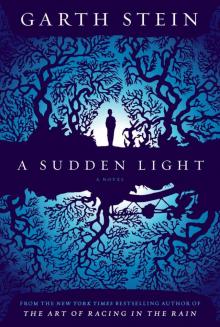 A Sudden Light
A Sudden Light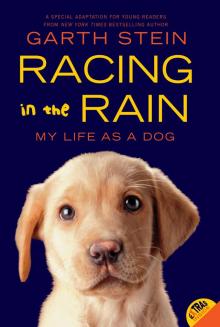 The Art of Racing in the Rain
The Art of Racing in the Rain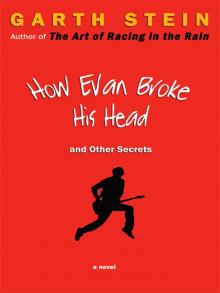 How Evan Broke His Head and Other Secrets
How Evan Broke His Head and Other Secrets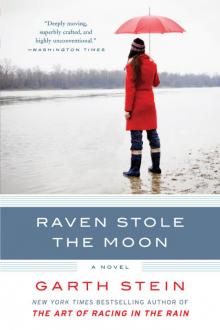 Raven Stole the Moon
Raven Stole the Moon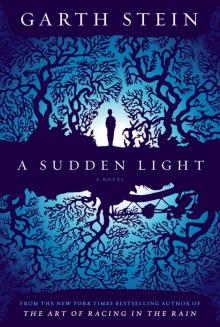 A Sudden Light: A Novel
A Sudden Light: A Novel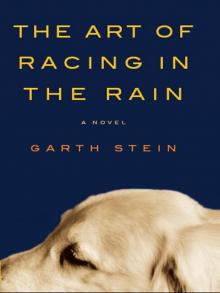 Art of Racing in the Rain, The
Art of Racing in the Rain, The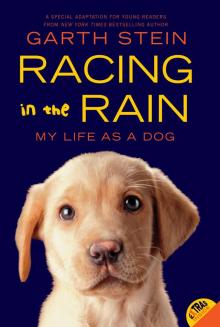 Racing in the Rain
Racing in the Rain